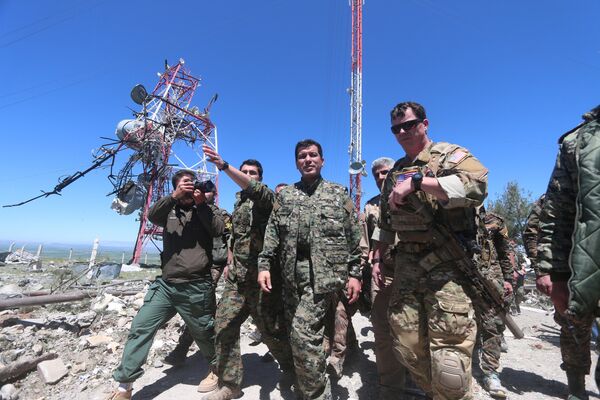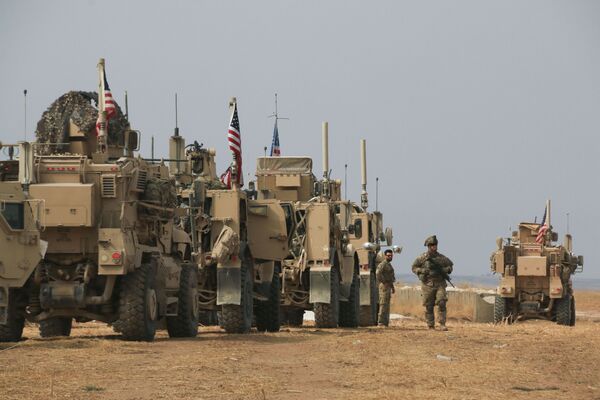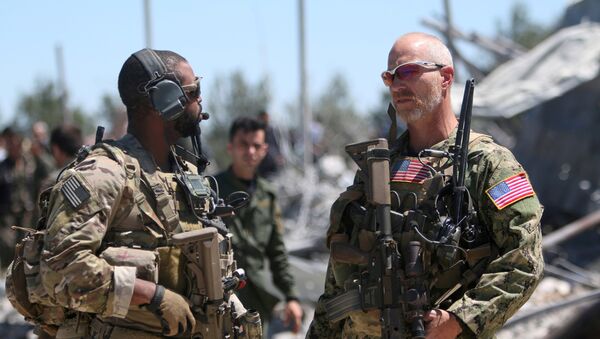On 21 September, US Special Representative Ambassador James Jeffrey travelled to northeast Syria and held separate meetings with the leaders of the US-backed Syrian Democratic Forces (SDF), as well as the delegations of the ongoing intra-Kurdish political dialogue.
Following the summit with the Syrian Kurdish leaders, Jeffrey headed to Erbil to meet with Nechirvan Barzani, the head of the Kurdistan Region of Iraq. The officials discussed the situation in Syria and the ongoing political talks between different Kurdish parties in the Arab Republic's northeastern region.
Intra-Kurdish Talks and US Political 'Guarantees'
The American special envoy is supervising the talks between the Kurdish National Council (ENKS) and the Kurdish National Unity Parties (PYNK), which resumed in 2019 after being started in 2014.
Among the issues discussed by Jeffrey and Syrian Kurds were the Kurds' fears of new Turkish military operations, according to Kurdish media outlet Rudaw. Citing Sama Bakdash, a spokesperson for the ruling Democratic Union Party (PYD), the media noted that the US ambassador told the Kurdish leaders that Washington would prevent any possible Turkish incursions in northeastern Syria.
"He said that Turkey should not attack (Syria) east of the Euphrates River, or any other part of the country that is not currently under its control. If it does, the US will prevent and sanction it, like it didn’t in the past," Bakdash pointed out.
The statements made by the US envoy can be interpreted as a call for the creation of a Kurdish state and were unlikely to have been previously agreed upon with Ankara, says Abdullah Agar, a security expert and retired special warfare and commando officer.
"Turkey has been fighting terrorism for decades", Abdullah Agar stresses. "This long-term struggle cannot end with the creation of a Kurdistan Workers' Party (PKK) state. In the past, in accordance with the realities of that time, a number of agreements were possibly concluded, but I do not think that any of them allowed the formation of a terrorist state or would have given, albeit indirectly, consent to this. In this case, Turkey would have simply crossed out all its achievements in the fight against terrorism."

US Strategy Endangers Territorial Integrity of Syria & Iraq
According to the security expert, by giving the Kurdish forces the aforementioned "guarantees", Washington is trying to tip the balance on the ground in its favour and is seeking to integrate opposition Kurdish structures and formations with the PKK, which has been designated as a terrorist organisation in Turkey. This course of events is fraught with risks of triggering a split in Syria and also in Iraq, he warns.
Agar recalls that the independence referendum organised by the Kurdish Regional Administration of Iraq on 25 September 2017 did not receive support from the United States. "Then Barzani was in a hurry, and as a result of this haste he lost Kirkuk," the ex-commando highlights. "However, now as the time and conditions have changed, the situation of destabilisation is evident."
The forces of the People's Protection Units (YPG) - the backbone of the SDF – and the PKK are being used by Washington to undermine the political structures of Syria and Iraq and ruin their territorial integrity, highlights Agar.
"Ultimately, everything will depend on the actions of regional players," the security specialist underscores. "As for Turkey's position, it is very clear: not to allow the PKK or the forces behind the PKK to use the minorities living in the region for their own purposes, and also to prevent the further growth of instability."

During the Syrian civil war which started in 2011, predominantly Kurdish groups led by the Democratic Union Party sought to establish autonomy in the northeast of the Arab Republic. On 12 July 2012, the Kurdish National Council (KNC) and the People’s Assembly of Western Kurdistan established by the PYD signed a unity agreement under the auspices of Iraqi Kurdistan President Massoud Barzani.
In November 2013 the Kurdish formations proclaimed the creation of the Autonomous Administration of North and East Syria (NES), or Rojava, which is officially recognised neither by the Syrian government nor by any international states or entities. Turkey considers the self-proclaimed Kurdish entity, located in close proximity to its southern border, as a direct security threat. Between 20 January and 24 March 2018 Ankara carried out Operation Olive Branch in the Afrin District of northwest Syria, which until their arrival had been controlled by the Kurds.
In October 2019, the Turkish Armed Forces and allied military groups launched an offensive into northeastern Syria codenamed Operation Peace Spring. However, the Trump administration stepped in and urged Turkish president Recep Tayyip Erdogan to suspend the advance. To date, the US has continued to maintain a limited military presence in the oil rich areas of northeast Syria, backing the Kurdish-dominated SDF despite Washington's earlier vows to pull out of the region.




